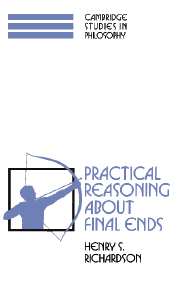VII - Practical coherence
Published online by Cambridge University Press: 05 June 2012
Summary
We have just arrived at the importance of building coherence among norms via considerations about how we may rationally settle conflicts among our norms. Yet the necessity of invoking some sort of coherence standard has been implicit in my argument ever since Chapter II, where I argued that practical reasoning should not be either reduced to deductive reasoning or assimilated to any pattern of necessary validity. These contrasting routes to a coherence account merge smoothly. The last section's argument suggests that our systems of norms are not and should not be pyramidally arrayed, with all value or warrant flowing from one or a few self-evident or self-presenting starting points at the peak. If there are starting points of this status, they are likely to be specific, scattered, and spread throughout our normative commitments. The question then arises how one can gather this dispersed warrant in support of a practical theory. Complementing this bidirectionality, Chapter II's argument implies that even if there were a few central starting points, practical reasoning could not flow of necessity from them alone. Instead, the nondeductive moves that are made from a norm to a conclusion can gain support from other norms in the system. To lay out this support is to build coherence among one's norms. This schematic answer about how to justify nondeductive moves, it will be noted, is also an answer to how to gather dispersed warrant, namely by connecting one's norms into a practical theory of sorts.
- Type
- Chapter
- Information
- Practical Reasoning about Final Ends , pp. 143 - 158Publisher: Cambridge University PressPrint publication year: 1994



